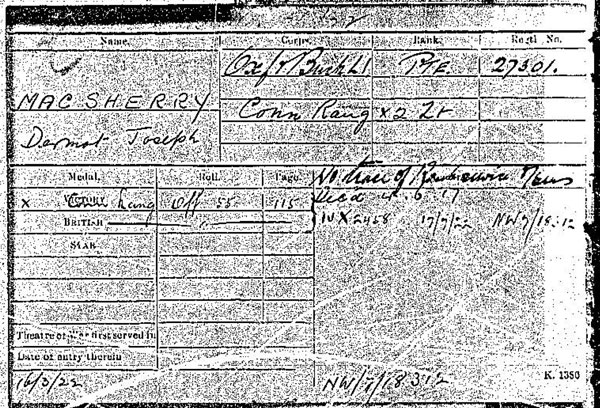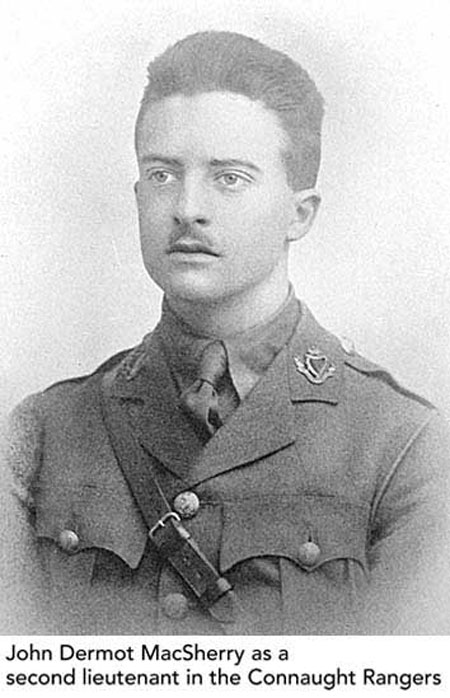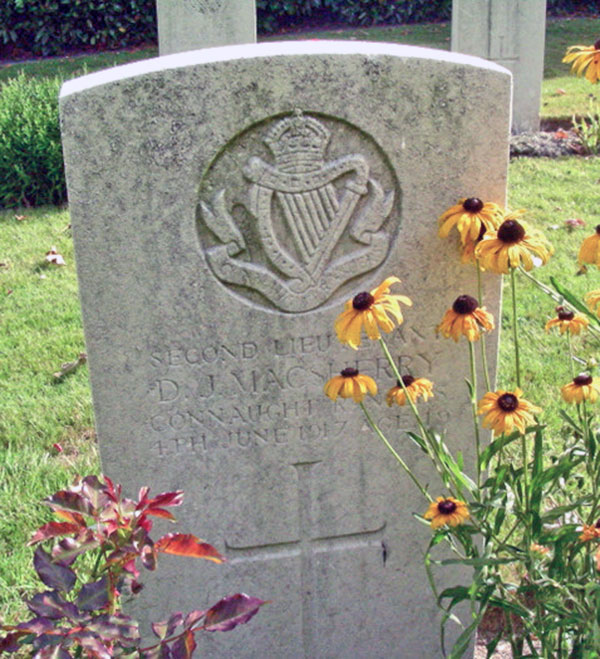| IT IS IMPORTANT TO NOTE THAT NO CONCLUSIVE EVIDENCE HAS BEEN FOUND TO LINK DERMOT JOSEPH MACSHERRY HIMSELF TO COOKSTOWN.
|
| Dermot Joseph MacSherry was born in Ireland about 1898. He was the only child of Thomas and Julia MacSherry.
|
| Family: Thomas MacSherry, Julia MacSherry, Dermot Joseph MacSherry (born about 1898).
|
| No record of the McSherry family can be found in the 1901 census.
|
| Dermot attended Stonyhurst College from 1911 to 1916. Stonyhurst College is a Roman Catholic public school in Lancashire, England
|
| The actor Charles Laughton and Dermot were both school friends and fellow actors. Laughton was in the school from 1912 to 1915. He and MacSherry were classmates until the last year of Upper Grammar, during which they both competed for Classics awards, as Charles was awarded the top prize in Lower Grammar, which MacSherry won the following year. Apart from Classics and theatricals, MacSherry was also noteworthy in elocution, winning a prize for it.
|
| Laughton and MacSherry were also together in the school's Officer Training Corps, Laughton as a humble cadet and MacSherry attaining the rank of Company-Sergeant-Major.
|
| After leaving Stonyhurst, MacSherry initially served briefly as a Private in the Oxfordshire and Buckinghamshire Light Infantry (with the regimental number 27301).
|
| Dermot later joined "E" Company, No. 6 Officers' Cadet Battalion at Balliol College, Oxford in August 1916, being gazetted to the 3rd Connaught Rangers the following February.
|

|
| As a newly-commissioned second lieutenant, he was sent to France shortly after his nineteenth birthday in March 1917 to be attached to the 6th Connaught Rangers (47th Brigade, 16th Irish Division).
|

|
| He spent a week in a base camp and then three weeks in the Divisional School before finally proceeding to join the battalion.
|
| A couple of days before his death, MacSherry had written a letter to her mother asking her to pray for him and not to worry if she didn't hear from him for a bit longer than usual. No doubt he was aware of the impending action and that in the course of this he could be wounded or killed.
|
| 2nd Lieutenant Dermot Joseph MacSherry was serving with the 3rd Battalion of the Connaught Rangers (attached to the 6th Battalion) when he was killed in action on 4th June 1917. He was just 19 years old.
|
| During the days prior to the battle of Messines, during the night of June 4-5th, having been in the trenches for only two days, Second Lieutenant John Dermot MacSherry took part in a raid against German trenches near Wytschaete. As his platoon returned to the British line, he was hit by shrapnel from an exploding shell and killed.
|
| A few days later, the 6th battalion Connaught Rangers took part in the battle of Messines (7-14 June 1917), which included the capture of Wytschaete.
|
| MacSherry's commanding officer wrote a letter of condolence to his mother. As a consolation he mentioned that the raid had been important in order to secure the success of the subsequent battle. An officer of his Company also wrote to MacSherry's parents at Birmingham, telling them, among other things, that he "was at Confession the night before going into the trenches". This however must have been little consolation to them as he was their only child.
|
| He was described in his obituary as "a boy of particularly fine character, upright, and honest, somewhat serious and reserved, but admired and respected by all for his high ideals and sense of duty".
|
| From the Belfast Newsletter dated 16th June 1917:
|

|
| Second Lieutenant Dermot J MacSherry, Connaught Rangers, killed in action on 4th June, was the only son of the late Mr Tom MacSherry, of Cookstown and Birmingham.
|
| 2nd Lieutenant Dermot Joseph MacSherry is buried in La Laiterie Military Cemetery, West-Vlaanderen, Belgium.
|

|
| The CWGC record 2nd Lieutenant Dermot Joseph MacSherry as a native of Ireland. He is also recorded as the son of Thomas and Julia MacSherry, of 64 Oval Road, Erdington, Birmingham.
|

|
